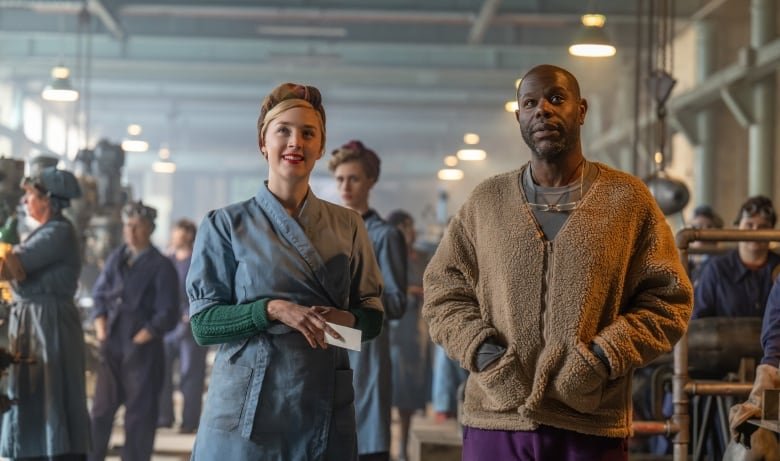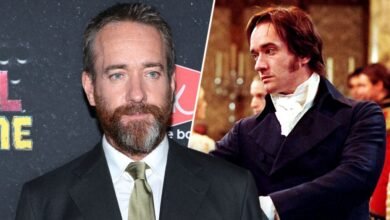Blitz recalls a long line of war movies going back decades, but that doesn’t mean it’s not relevant | CBC News

[ad_1]
The Shawshank Redemption‘s final scene — recognized as one of the most famous, memorable and satisfying conclusions in film history — nearly didn’t exist.
Instead, it ended roughly a minute earlier: Red sitting on the bus with an old note from his friend in hand, unsure if Andy was still alive and unsure even of his choice to continue living instead of taking an easy exit swinging from the rafters.
“I hope to see my friend and shake his hand. I hope the Pacific is as blue as it has been in my dreams,” he says. “I hope.”
Ultimately, that bleak and timorous ending was — for once — improved by a savvy studio executive. The purpose of Shawshank was for it to be a clear statement on the possibility of redemption; leaving the journey inconclusive would cheapen its impact, even if it felt more realistic.
“It was actually Castle Rock [Entertainment] who said, ‘Guys, you can’t do that,'” producer Niki Marvin explained in a behind-the-scenes featurette. “The last 20 minutes of the movie is about these two men getting together, and you can’t cheat the audience out of that.”
WATCH | Trailer for war movie Blitz:
But Blitz, the new film from British writer-director Steve McQueen, ends in just that way. Following a mother and son during the London Blitz — Nazi Germany’s sustained and devastating bombing campaign on the city — McQueen’s story concludes with a black screen and a whispered entreaty for a peaceful future. Or, to be more faithful to the experience of those caught up in a world war, literally any future at all.
That lack of certainty undergirds McQueen’s effort. There is the plot itself. Nine-year-old George (Elliott Heffernan) is sent to the British countryside to escape the bombing but makes the split-second decision to jump from a moving train and run home. Not only assaulted by the winding, unfamiliar streets, he’s hit by the dangerous nature of his own identity: a half-Black child with an unknown father, buffeted by a society ostensibly drawn together under the “keep calm and carry on” sentiment but really as suspicious and accusatory of perceived outsiders as ever.
There is class struggle: the soldiers disillusioned over orders to keep Londoners from seeking shelter in the Underground, and the Londoners alternately opting to sacrifice their own safety to protect others, or to loot their neighbours’ businesses — and even corpses. And of course, there are the worries of George’s mom, Rita (Saoirse Ronan).
A working-class single mother, she’s forced to balance joining the nearly one million British women working in wartime munitions factories while also raising her son. And without any way to protect her loved ones from both imperial and racist violence, she’s also forced to decide whether to send her child away from her against his will — then wrestle with the consequences for the rest of her life.

And there is the repeated imagery of black and white daisies — an artistic flare drawn from the experimental 1926 film Emak Bakia, intended to represent the unfounded faith in a beautiful future from the pessimistic interwar period. That, more than anything, pushes McQueen’s anti-Shawshank inclinations home: Blitz is a mess of intentions and interlocking themes specifically because the director seems so unsure.
As much then as now, the future appears dark. And with war, apocalypse and death on the horizon, there’s little you can do beyond looking up.
“Listen, it’s possible that we could change the course of events … but can we?” McQueen explained via Zoom at a recent Q&A session in Toronto. “That’s why I ended on a wish, which is very flimsy. So I won’t necessarily say that’s a happy ending, but it’s — at least we’ve got a wish.”
War movies a fundamental part of cinema
As to how well it works, Blitz is a mixed bag. It very obviously echoes what Scott Anthony, in his new book The Story of British Propaganda Film, termed the “heroic” age. Then, state-sponsored or influenced documentaries like Fires Were Started, London Can Take It! and Desert Victory (or Germany’s Triumph of the Will) were designed specifically to influence hundreds of millions of citizens to believe they would win the war only by heroically fighting through it.
And they worked: British intelligence cited the Nazi film Baptism of Fire as helping convince Sweden and Spain to declare neutrality. And Winston Churchill believed Mrs. Miniver, which won the Academy Award for best picture in 1943, made America’s entry into the war seem inevitable, doing “more for the Allied cause than a flotilla of battleships.”
It’s a formula so rousingly successful it became, and remains, a fundamental part of cinema. Going back to the first-ever best picture winner (the silent film Wings) in 1929, roughly 20 war movies have taken home the top trophy at the Oscars, with the vast majority set during the Second World War. So in McQueen’s overwhelmingly conventional — and surprisingly commercial — Blitz, there’s little here to earn a revisit.
That is aside from the briefly taken up, then immediately undercut and dropped, theme of racism, because George’s struggle to connect with the “Blitz spirit” — the idea of stoic communal resistance that the Guardian came to label a “cruel myth” — is an interesting subversion of wartime experiences. Unfortunately it fizzles out following a tritely successful monologue about not seeing colour, and is then buried underneath the confusing mix of themes McQueen attempts to explore.

Really, it seems as though McQueen was more concerned with making a collage of historical anecdotes than being incisive. It’s a surprising move for a filmmaker with something as heartrending and direct as Hunger‘s takedown of British colonialism in his filmography. And it leads Blitz to become more or less a pastiche of other war films with more economical, and affecting, focus.
For the story of a conflicted citizen behind enemy lines, see ’71. To see the struggle of everyday people crushed by political conflict, there’s Overlord, Lights Out in Europe and Germany, Year Zero. And for the exhaustingly utilized trope of emphasizing the futile horrors of war through the eyes of a child, the list is virtually unending.
There’s Come and See, The Painted Bird, A Bag of Marbles, Barefoot Gen, Grave of the Fireflies, Ivan’s Childhood, Empire of the Sun, The Island on Bird Street, Machuca, The Tin Drum, Innocent Voices, Run Boy Run, Jojo Rabbit, Life Is Beautiful — and that’s just to start. It is a subgenre so expansively and unrelentingly mined, this entire article could be replaced with their titles and we still wouldn’t have scratched the surface.
The reason, as Karen Lury explains in The Child in Cinema, is that childhood is an irresistible political tool. Because we are conditioned to protect children above all other groups, and because children have little identity in fiction, they can be used as an easy call to action, or criticism of current failings. And when showing them in hopeless situations, we “are all hoodwinked into saving [them] and preparing for a future-yet-to-come and which, of course, never actually arrives.”
But even if Blitz is using that old language in a somewhat tired, traditional way, it is still valuable — especially now. Alongside a stunningly impressive performance by its child lead, the lack of conviction has a certain charm — as does its wish — because especially during dark times, persevering can feel futile.
But nowhere is there more room for hope than in the dark. And hope, in itself, can be worth it.




